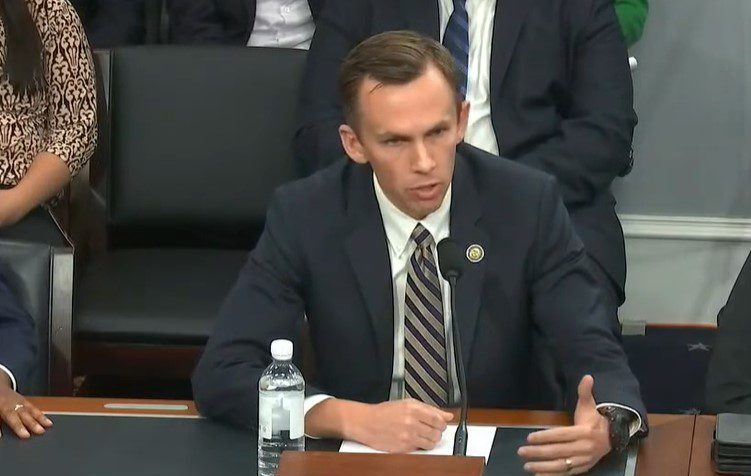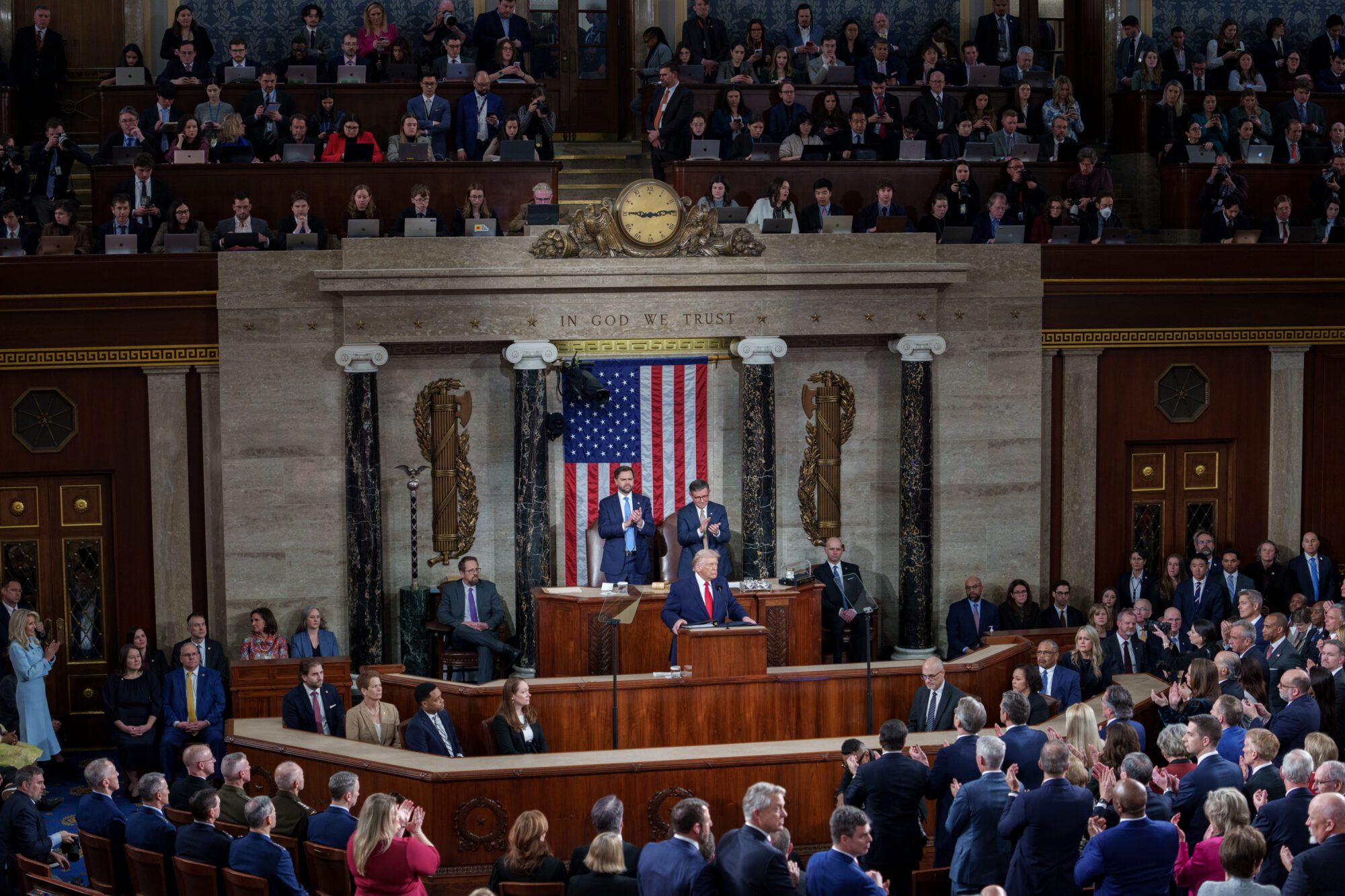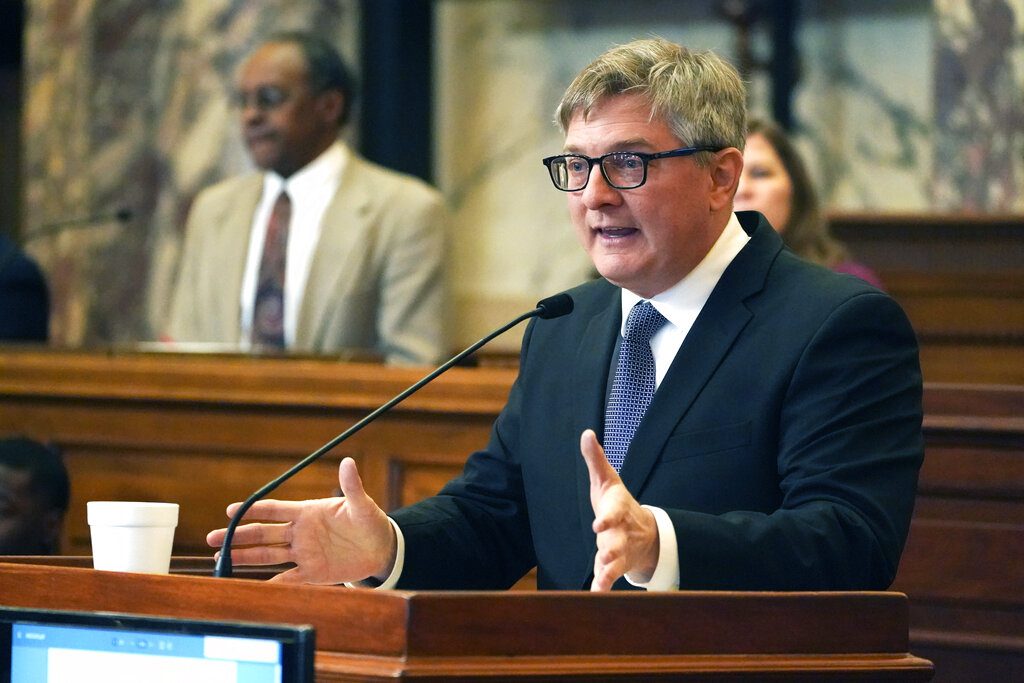
Auditor Shad White appears before a U.S. House Ways & Means Subcommittee to discuss TANF, July 2023 (From Livestream)
Auditor White told the Congressional committee that the norm in Mississippi between 2016 and 2019 was for TANF funds to be misspent. White offered recommendations on preventing such fraud and abuse in the future.
On Wednesday, Mississippi State Auditor appeared before the U.S. House Ways and Means Subcommittee on Work and Welfare as part of a hearing titled “Where is all the Welfare Money Going? Reclaiming TANF Non-Assistance Dollars to Lift Americans Out of Poverty.”
White was joined by Tennessee Department of Human Services Clarence Carter, Missouri Department of Social Services Director Robert Knodell, Arkansas Department of Human Services Secretary Kristi Putnam, and Springboard to Opportunities CEO Dr. Aisha Nyandoro.
Subcommittee Chairman Congressman Darin LaHood (R-Illinois) opened the hearing, saying, “Recently Republicans were able to secure a major victory with the Fiscal Responsibility Act which strengthened work requirements in the direct cash assistance portion of the Temporary Assistance for Needy Families program.”
LaHood said the day’s hearing was meant to address non-assistance spending.
“Non-assistance funding constitutes the majority of the TANF Block Grant, nearly 78% of combined federal and state spending,” Congressman LaHood said. “This is spending that is not for basic assistance or direct checks to welfare recipients. Concerns have emerged that the non-assistance part of TANF lacks guardrails and is not focused on helping people move from welfare to work.”
LaHood said national headlines out of Mississippi have drawn increased scrutiny of the TANF program. Auditor White, he said, was present to provide firsthand knowledge of what transpired in the Mississippi case while offering recommendations on how such financial mismanagement can be avoided in other states.
“My hope in testifying today is that the story of what happened in my home state will help ensure that it never happens again elsewhere,” White told the committee.
White began by outlining the history of the TANF scandal in Mississippi. He said the case started in the summer of 2019 when a whistleblower tip alerted his office that there may be a kick back between the then-head of the state Department of Human Services and a vendor to DHS. White said he ordered an investigation into the matter while also having his staff examine how TANF dollars were being spent as they prepared the required federal audit in process. After nearly seven months of work, the Auditor’s office determined that “north of $90 million of both TANF funds and other welfare funds had been misspent in the state,” adding that there was likely “multiple fraud schemes” at work.
“I would say the norm from 2016 to 2019 in Mississippi was for the dollars to be misspent rather than spent on an allowable purchase,” White said. “It was really a tragedy that unfolded in a very short amount of time over the course of three to four years.”
Auditor White told the committee that knowing one non-profit in particular was receiving funds and misspending them “was likely to also get an additional grant.” With that understanding, White said the office had to act quickly, taking what they found to the prosecutor in Hinds County in February 2020. That action led to the indictment of six individuals.
A few months later, White told the committee, his office concluded the federal audit, known as the Single Audit, and found “multiple instances of misspent TANF funds outside of the fraud cases.”
Fast forwarding to today, Auditor White said six individuals have pleaded guilty to either state or federal charges, noting that he is limited in what he can say on certain matters as the criminal case is still ongoing.
“My office has turned over everything that we have over to the FBI, and the FBI and federal prosecutors at the Department of Justice have asked to take the leading role in indicting and investigating anyone who is new beyond the original six people that we investigated,” White said. “We agreed to that arrangement, and we have been assisting since then. That was about three years ago.”
As to the other misspent funds, Auditor White said the state is suing multiple individuals in hopes of recovering dollars.
Running through a few examples of how TANF had been misspent in Mississippi, White noted the use of funds to run advertisements at “out-of-state college bowl games” and “NCAA bracket games outside of Mississippi,” as well as pay celebrities and athletes for advertisements “with little or not work product.” White also mentioned the personal use of funds by Nancy and Zach New related to a home, cars, repaying personal loans, and more.
Congressman LaHood asked Auditor White what recommendations he had on how to ensure what happened in Mississippi did not happen again in his home state or in other states.
White told the committee that the lack of monitoring was a primary concern.
“What we saw at DHS in Mississippi was large grants were being handed out to non-profits and then the agency itself was not showing proof that they went out and monitored those non-profits to ensure that the dollars were actually going to benefit the people who were eligible,” White said.
Auditor White said the State Auditor’s office found this to be the case as far back as 2013, before he was in office, and wrote of the concern in the Single Audit reported to the federal government year after year.
“What we ultimately found was that there was a reason these non-profits weren’t being monitored. The head of the agency did not want them monitored because he was handing large amounts of funds to the non-profits and then he and the non-profit executives were discussing ways to spend those dollars in violation of the law and in violation of TANF [regulations],” White said.
Using that background, Auditor White told the Congressional committee that one easy recommendation he would make is that anytime the U.S. Department of Health and Human Services sees in a Single Audit from a state that an agency is not monitoring their subgrantees or non-profits “something needs to be done.” White suggested HHS send in federal agents, level penalties against the state agency, and investigate those non-profits.
“Over the course of the last several years we have not seen the federal government take strong action when misspending does happen. So, in Mississippi, for example, we submitted our Single Audit in the spring of 2020, that’s obviously over three years ago and to date we don’t know what HHS’s response is, response will be to that audit,” White said. “So, the state of Mississippi is still waiting to hear. I think HHS and the federal government could send a strong signal to states that the program itself takes fraud and misspending very seriously by telling this state what it needs to remedy and then what penalties it’s going to impose on the state.”
Auditor White said his office has not communicated with HHS since August of 2021. He told the U.S. House committee that state lawmakers in Mississippi are waiting to find out how much the state is going to have to pay back to the federal government TANF fund or other funds.
Another recommendation Auditor White conveyed to the committee was born out of his office’s investigation that found that there was no real proof persons participating in an event or function funded with TANF dollars “was needy.” He used the example of the renting of a private softball field.
White suggested limiting access of non-assistance TANF funds to programs and services for persons under 200% of the poverty level, providing more constraints on the use of the funds.
In addition, Auditor White submitted other recommendations to the committee aimed at strengthening oversight and accountability. He recommended the federal Department of Health and Human Services:
- Require state agency heads to sign statements under penalty of perjury about the number of people served by welfare.
- Punish state agencies that fail to properly monitor nonprofits receiving welfare grants.
- Report improper spending to Congress.
You can watch the full House Committee hearing where State Auditor White appeared this week below.











